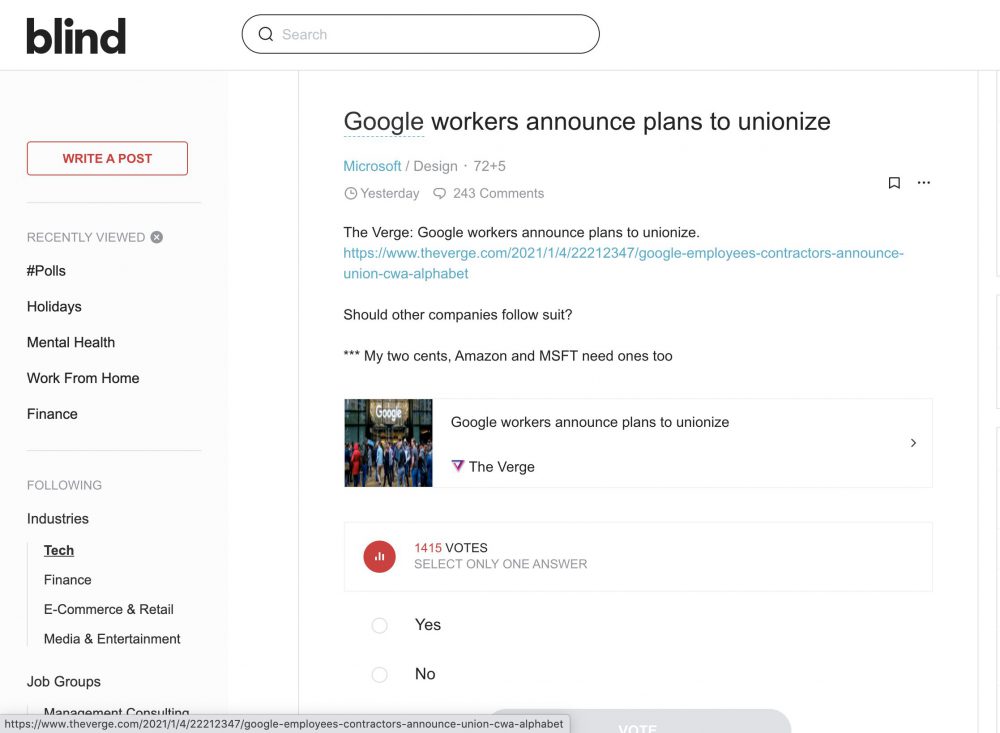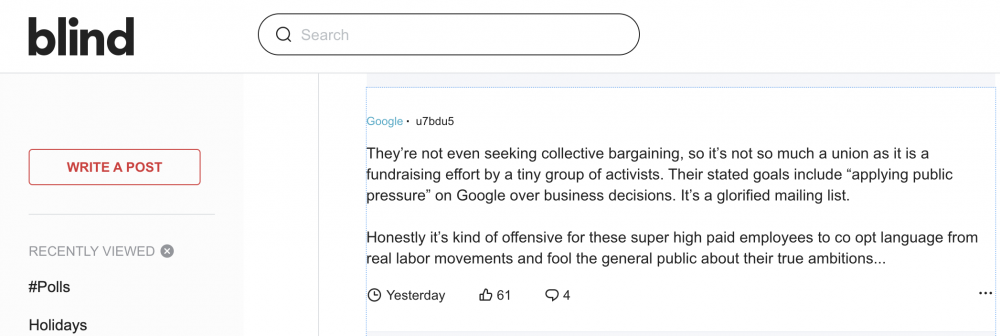80% of Google Survey Respondents Say Other Companies Should Not Unionize

Chewy Shaw, an engineer at Google in the San Francisco Bay Area said that Google’s union was a necessary tool to sustain pressure on management so that workers could force changes on workplace issues.
A Microsoft professional asked the Blind network, “Google workers announce plans to unionize. Should other companies follow suit?”

Of the 750 poll respondents, 251 work at Google, here are some key learnings:
- Overall, 40% of respondents think other companies should follow Google’s plan to unionize
- However, 80% of Google respondents say other companies should not unionize
You can see the key learnings here.
“Our goals go beyond the workplace questions of, ‘Are people getting paid enough?’ Our issues are going much broader,” he said. “It is a time where a union is an answer to these problems.”
In Silicon Valley, unions are a rare occurrence. Salaries aren’t particularly contentious because they’re already quite high, and the tech industry’s globally scattered workforces are hard to organize, per the NYT.
A Blind user at Google responded, “Anyway it’s not about Google but its employees. Businesses’ main purpose to generate profit so there need to be external bodies that ensure they balance that with the well-being of their employees. Labor unions are one of such bodies. The labor board is another. Regardless, this particular union is more about social issues I’m not sure the above applies. I’m guessing Google might be able to dodge litigation though if some of these things are hashed out early.”
The new union is the clearest sign of how thoroughly employee activism has swept through Silicon Valley over the past few years. While software engineers and other tech workers largely kept quiet in the past on societal and political issues, employees at Amazon, Salesforce, Pinterest, and others have become more vocal on matters like diversity, pay discrimination, and sexual harassment.
A different Google user shared, “They’re not even seeking collective bargaining, so it’s not so much a union as it is a fundraising effort by a tiny group of activists. Their stated goals include “applying public pressure” on Google over business decisions. It’s a glorified mailing list. Honestly, it’s kind of offensive for these super high paid employees to co-opt language from real labor movements and fool the general public about their true ambitions…”

An Amazon professional responded, “this is huge if it gains traction at google. if it can happen at google it can happen at all of the large tech companies”.

For years, Google employees have criticized management for their approach to issues including sexual harassment in the workplace, the company’s work with the Pentagon, and treatment of contract workers. A few examples:
- In 2018, more than 20,000 Googlers walked out of work to protest the company’s handling of sexual assault claims.
- That same year, thousands of employees signed a petition protesting Google’s work with Project Maven, a Defense Department initiative that could theoretically improve the precision of drone strikes. Google discontinued the contract.
- The most recent flashpoint was the December 2020 firing of leading AI ethics researcher Timnit Gebru, a Black woman who said Google dismissed her because she was fighting bias in algorithms
Other labor organizing efforts in tech are in the works. Kickstarter workers unionized last year, and Amazon warehouse workers in Alabama will likely vote in a few weeks on whether to form the company’s first U.S. union. So, despite 80% of Google employees saying other companies should not unionize, this trend seems like it will extend well into 2021.
Google workers announce plans to unionize